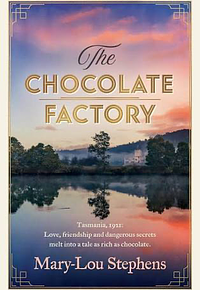Take a photo of a barcode or cover
informative
mysterious
medium-paced
Plot or Character Driven:
A mix
Strong character development:
Complicated
Loveable characters:
No
Diverse cast of characters:
No
Flaws of characters a main focus:
Complicated
The setting and breadth of research were the highlight of this book for me. It was clear the author put a lot of time and effort into the research for this book. The attention to detail regarding the development of the factory and chocolate production was quite impressive and I learnt a lot about the development of the Cadbury brand, as well as the Tasmanian factory. The details about life in the little Cadbury factory town, the company's links to Quakerism, and of course the inclusion of chocolate spies were wonderful. That being said, it was possibly the only positive of my reading experience and the reason I decided to bump it up an extra 0.5⭐.
The two POV characters, Dorothy and Maisie, were insufferable. Dorothy was a know-it-all who believed she was better than everyone else yet clearly the author's favourite and even when she was still doing wrong the book presented her to me as though she were perfect. Maisie was completely irrelevant to the plot for the first 300 pages and was also the most awful person to Frank for no real reason.The way he basically told her 'I believe all people are equal and we shouldn't kill each other :)' and her response was basically 'HOW DARE YOU SAY MY FATHER IS THE DEVIL JUST BECAUSE HE FOUGHT IN THE WAR' was insane and I'm sorry but I couldn't support anything she did after he fucked him over like that because Frank was literally the ONLY likable character in this book.
The romance between Dorothy and Thomas was also a little weird. I didn't hate it buttrying to justify Dorothy's adultery rubbed me the wrong way and the continued reminder of 'but Thomas's wife is a BAD PERSON' doesn't stop the fact Dorothy was getting with a married man. Like you get your man girl but she's allowed to be messy and flawed and we don't have to be justifying the situation?
The plot was simplistic, the writing style made me feel spoken down to and as though the author thinks I’m stupid (explaining and overexplaining everything at least three times), and the obsession with Dorothy's Birmingham accent as though it were the defining hurdle in her life was the most irritating plot line through this book.When she confronts Percy at the end and the line 'Her accent was pure Brummie' was supposed to be this girl-boss move I actually nearly threw the book across the room because I cannot believe that subplot made it to the climax of the novel. And do NOT get me started on the name reveal of 'Cecil Bottom' because I have never had my suspension of disbelief yanked out from under me with such quickness.
Not to mention, Dorothy is a Career Woman™ and she has goals (big respect) but the ending was so disappointing and underwhelming.When Dorothy left the Hobart factory because she was looked over for the Board that made sense for her character. I thought maybe Sarah or Ida or Thomas would convince her to stay or even Mr Cadbury showing up at her door might prompt him to invite her to the board, but no. She agreed to take up the same position she had back at the English factory? She was essentially in the same position she would've been in had she not resigned from the Hobart factory, which (again) was because she couldn't get any further with her career there? It just didn't make any sense. It also ended the book on a weird note because the novel was this adventure to Tasmania and I thought it would showcase the history and beauty of the state but instead it ends with the main character essentially going 'nah one year here is enough for me, peace out' and then goes back to England? I felt let down and the book I'd picked up because it was by a Tasmanian and set in Tasmania but somehow this part of the world wasn't good enough for Dorothy.
Overall, the first half of the book is overexplained and there's barely nothing happening, and then the plot kicks off and you think 'oh, yeah, this is getting good now' and then you swiftly get let down again and again until you close the back cover and wonder why you didn't DNF at page 50.
The two POV characters, Dorothy and Maisie, were insufferable. Dorothy was a know-it-all who believed she was better than everyone else yet clearly the author's favourite and even when she was still doing wrong the book presented her to me as though she were perfect. Maisie was completely irrelevant to the plot for the first 300 pages and was also the most awful person to Frank for no real reason.
The romance between Dorothy and Thomas was also a little weird. I didn't hate it but
The plot was simplistic, the writing style made me feel spoken down to and as though the author thinks I’m stupid (explaining and overexplaining everything at least three times), and the obsession with Dorothy's Birmingham accent as though it were the defining hurdle in her life was the most irritating plot line through this book.
Not to mention, Dorothy is a Career Woman™ and she has goals (big respect) but the ending was so disappointing and underwhelming.
Overall, the first half of the book is overexplained and there's barely nothing happening, and then the plot kicks off and you think 'oh, yeah, this is getting good now' and then you swiftly get let down again and again until you close the back cover and wonder why you didn't DNF at page 50.
informative
lighthearted
mysterious
medium-paced
Plot or Character Driven:
A mix
An intriguing look at the beginning of Cadbury chocolate in Australia and the lengths gone to in an attempt to steal the coveted recipe for Dairy Milk. As the author says in her notes, this may sound familiar to readers of Charlie and the Chocolate Factory as Roald Dahl went to boarding school near Bournville in the UK and was fascinated with the tales of chocolate spies and with the process of chocolate manufacture.
Although the story was interesting, this book really made me fascinated to learn more about the history of Cadbury and the Cadbury family. It seems they truly built the ideal workplace and community.
Although the story was interesting, this book really made me fascinated to learn more about the history of Cadbury and the Cadbury family. It seems they truly built the ideal workplace and community.
adventurous
lighthearted
relaxing
slow-paced
Plot or Character Driven:
Plot
Strong character development:
No
Loveable characters:
Complicated
Diverse cast of characters:
No
Flaws of characters a main focus:
Yes
1920s Tasmania, scandals and the culture of Cadbury's chocolate factory.
Cosy read with a wholesome ending.
I almost quit the book at 50 pages in. I found it so boring, overly descriptive and every thought or detail overly explained. It was a slow burn for the first 150 pages and felt like words on a page.
I'm glad I stuck it out, after the slow start, the plot kicked off and the read was more enjoyable, immersive and I was invested in the characters.
Be warned, very slow start but I think it's worth it.
The Sarah character bugged me. She reminded me of Donna from the TV show SUITS. How can she possible know everything?
I feel let down with the other Bourneville women who journeyed across to Tasmania. I think there could have been more with Ida, Lizzie, Margaret and Esme. I felt like there could have been more character development.
I did love the wholesome ending.
I t was eye opening to learn so much about the Cadbury culture, Quakerism and the societal values and culture compared to life today.
Cosy read with a wholesome ending.
I almost quit the book at 50 pages in. I found it so boring, overly descriptive and every thought or detail overly explained. It was a slow burn for the first 150 pages and felt like words on a page.
I'm glad I stuck it out, after the slow start, the plot kicked off and the read was more enjoyable, immersive and I was invested in the characters.
Be warned, very slow start but I think it's worth it.
The Sarah character bugged me. She reminded me of Donna from the TV show SUITS. How can she possible know everything?
I feel let down with the other Bourneville women who journeyed across to Tasmania. I think there could have been more with Ida, Lizzie, Margaret and Esme. I felt like there could have been more character development.
I did love the wholesome ending.
I t was eye opening to learn so much about the Cadbury culture, Quakerism and the societal values and culture compared to life today.
inspiring
lighthearted
slow-paced
Plot or Character Driven:
A mix
Strong character development:
No
Loveable characters:
Yes
Diverse cast of characters:
No
Flaws of characters a main focus:
Complicated
This book was quite charming and easy to read.
I loved learning about how the Cadbury's in Tasmania came to be. This book was based entirely on fact so I found that information very interesting and was what really carried the book for me.
The plot itself was a bit slow and didn't have too much going on, a bit repetitive here and there but luckily the writing style was quite simple so I was able to read through it fairly quickly.
This was enjoyable, not too complex and I always love reading stories set in Australia by Australian authors :)
I loved learning about how the Cadbury's in Tasmania came to be. This book was based entirely on fact so I found that information very interesting and was what really carried the book for me.
The plot itself was a bit slow and didn't have too much going on, a bit repetitive here and there but luckily the writing style was quite simple so I was able to read through it fairly quickly.
This was enjoyable, not too complex and I always love reading stories set in Australia by Australian authors :)
sad
slow-paced
Plot or Character Driven:
Character
Strong character development:
Complicated
Loveable characters:
Complicated
Diverse cast of characters:
No
Flaws of characters a main focus:
Yes
adventurous
emotional
funny
hopeful
informative
inspiring
mysterious
reflective
sad
medium-paced
Plot or Character Driven:
A mix
Strong character development:
Yes
Loveable characters:
Yes
Diverse cast of characters:
Complicated
Flaws of characters a main focus:
Complicated
hopeful
informative
mysterious
relaxing
medium-paced
Plot or Character Driven:
A mix
Strong character development:
Yes
Diverse cast of characters:
Yes
Flaws of characters a main focus:
No
informative
slow-paced
Plot or Character Driven:
Character
Strong character development:
Complicated
Loveable characters:
Yes
Diverse cast of characters:
No
Flaws of characters a main focus:
No
The historical info was interesting, as I live nearby. I remember going on trips to the factory and I have family still working there. The characters were a bit thin to me, either good/bad, and the plot a bit predictable. A good read overall.
The Chocolate Factory is a fantastic story of the establishment of Cadbury’s (and Fry’s Chocolate, and Pascall’s lollies) first factory outside the UK near Hobart, Tasmania. While it is fictional, it does contain a lot of detail about the establishment of the factory and how chocolate is made. The last section is particularly thrilling as chocolate spies (yes, they were a thing – the recipe for Dairy Milk chocolate was a hotly guarded secret) take over the narrative.
The story starts as widow Dorothy is en route from Bournville, the original home of Cadbury to the new factory in Tasmania. Dorothy credits Cadbury for giving her a chance to make something of her life, as well as giving her opportunities during the war and to leave bad memories behind. Initially the focus is on the setting up of the factory, getting to know the other women workers and recruiting locals. (Not all the women knew each other as some came from Fry’s and Pascall’s factories). Dorothy is also keen to help Thomas, a man she met on the voyage, to recover from shell shock as she couldn’t help her own husband. Some of the narrative is then told from Maisie’s point of view, one of the new workers who comes from a poor family and is eager to earn money so that her sister doesn’t have to leave school. The story then goes through the opening of the factory and the various jobs, but things take a subtly sinister turn as Dorothy receives anonymous notes detailing various slip-ups and that she has something of ‘great worth’. Maisie is tempted by the promise of more should she assist others with their own research. As the chocolate spies become closer, the story speeds up a lot from its original gentle pace with some sudden, unexpected twists.
I enjoyed The Chocolate Factory. I did find the first couple of chapters overly flowery, with everything described just that bit too much for me. As the story went on, it didn’t seem to jar me so much (or it just toned down). Some of the characters, such as Dorothy and Maisie are well fleshed out. I felt that Dorothy’s friend Sarah wasn’t as well detailed until towards the end, where some of her secrets are spilled. Esme, Dorothy’s sort of nemesis, doesn’t have her motivations spelled out all that well and she becomes more of a caricature and laughing stock that a threat later on. I did appreciate the amount of research done on the establishment of the factory and the various roles of the workers. I’ve visited the (now closed) New Zealand Cadbury factory multiple times and it struck me how hands on the work was then – let alone back in the 1920s! I feel that Stephens explained well the thoughts and motivations of the Cadbury family in their ‘factory within a park’ and opportunities for improvement for their workers. I wonder what they would think of the current owners, Mondelez International?
I would recommend this book to those with a keen interest in the history of the Cadbury factory in Tasmania who enjoy an interesting story.
Thank you to Harlequin for the copy of the book. My review is honest.
http://samstillreading.wordpress.com
The story starts as widow Dorothy is en route from Bournville, the original home of Cadbury to the new factory in Tasmania. Dorothy credits Cadbury for giving her a chance to make something of her life, as well as giving her opportunities during the war and to leave bad memories behind. Initially the focus is on the setting up of the factory, getting to know the other women workers and recruiting locals. (Not all the women knew each other as some came from Fry’s and Pascall’s factories). Dorothy is also keen to help Thomas, a man she met on the voyage, to recover from shell shock as she couldn’t help her own husband. Some of the narrative is then told from Maisie’s point of view, one of the new workers who comes from a poor family and is eager to earn money so that her sister doesn’t have to leave school. The story then goes through the opening of the factory and the various jobs, but things take a subtly sinister turn as Dorothy receives anonymous notes detailing various slip-ups and that she has something of ‘great worth’. Maisie is tempted by the promise of more should she assist others with their own research. As the chocolate spies become closer, the story speeds up a lot from its original gentle pace with some sudden, unexpected twists.
I enjoyed The Chocolate Factory. I did find the first couple of chapters overly flowery, with everything described just that bit too much for me. As the story went on, it didn’t seem to jar me so much (or it just toned down). Some of the characters, such as Dorothy and Maisie are well fleshed out. I felt that Dorothy’s friend Sarah wasn’t as well detailed until towards the end, where some of her secrets are spilled. Esme, Dorothy’s sort of nemesis, doesn’t have her motivations spelled out all that well and she becomes more of a caricature and laughing stock that a threat later on. I did appreciate the amount of research done on the establishment of the factory and the various roles of the workers. I’ve visited the (now closed) New Zealand Cadbury factory multiple times and it struck me how hands on the work was then – let alone back in the 1920s! I feel that Stephens explained well the thoughts and motivations of the Cadbury family in their ‘factory within a park’ and opportunities for improvement for their workers. I wonder what they would think of the current owners, Mondelez International?
I would recommend this book to those with a keen interest in the history of the Cadbury factory in Tasmania who enjoy an interesting story.
Thank you to Harlequin for the copy of the book. My review is honest.
http://samstillreading.wordpress.com



